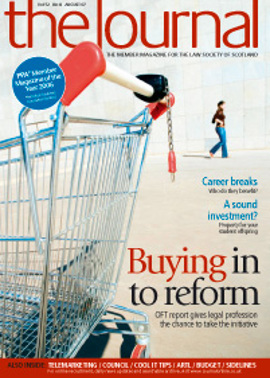Budget under the bonnet

Capital allowances
Among the most important changes coming out of this year’s Budget are those relating to capital allowances. There is a package, combining immediate and prospective reforms.
The first year allowance for small businesses buying plant and machinery, of 50%, is to be extended for a further year, until March 2008. More radically, a consultation is taking place on a proposal for small and medium businesses to be allowed a tax deduction for an annual investment allowance of up to £50,000.
But the real and potential changes are not all one way. The rate of writing down allowances for plant and machinery is reduced from 25% to 20%. Further changes in writing down allowances, notably on fixtures in buildings and on so-called “green” expenditure, may be introduced after another round of consultation.
Industrial buildings allowances and
There is to be a 100% capital allowance available for expenditure on the renovation of disused business premises in disadvantaged areas. There will also be changes to the capital allowances regime for cars; and new rules in relation to the construction of biofuel plants.
On a note related to capital allowances, there are increases in the tax credits available for research and development by large companies (to 130% of qualifying expenditure) and small and medium-sized enterprises (to 175% of qualifying expenditure). The more generous regime is to be extended to a slightly wider class of company.
Other business measures
A new regime for taxation in relation to film production was introduced in 2006. Provisions are to be introduced this year for companies to opt out of the special regime.A number of rather complex anti-avoidance provisions are to be introduced in relation to direct business taxes. Some at least of those are in direct response to disclosures made of tax planning schemes under the new disclosure regime introduced last year. It is thought that HMRC regard this regime as having been successful. Professional advisers should be aware that there may be increased moves to punish non-compliance with the disclosure regime, although the professional privilege available to solicitors may remain relevant in some cases.
There is a useful change to the stamp duty rules on reconstructions, which will prevent the need for companies which acquire their own shares to cancel them.
In relation to value added tax, the changes made this year are relatively limited. They include the usual increase in the registration threshold, this year from £61,000 to £64,000. The VAT fuel scale charge will in future be based on engine emissions, rather than engine size. The reduced 5% rate of VAT, the application of which has expanded in recent years, is to be further extended so as to apply to certain housing alterations for elderly people. There is a further extension in the regime allowing HMRC to direct that taxpayers in a supply chain are jointly and severally liable for any VAT that goes missing, making this regime apply to certain electronic equipment.
Employment issues
There is a very serious extension to what is still known as the IR35 regime, as part of an HMRC drive to root out the tax advantages perceived to arise from disguising employment as some other arrangement, usually with significant income tax and national insurance advantages. The extension takes the form of a new regime of what are termed managed service companies. The new rules extend PAYE and NIC treatment to payments made to relevant individuals through such companies. Although the prime liability will be on the company deemed to offend these rules, there are provisions allowing HMRC to transfer the tax liabilities to those behind such companies, to prevent the obligations being avoided through insolvency or liquidation.
There are a number of changes made to the rules on cars provided for employees. These take account of the increasing range of new fuels on which cars may run. More generally, and perhaps surprisingly, the figure from which a varying percentage is taken as a tax charge on the benefit of free fuel is to be frozen for 2007-08.
An extra-statutory concession providing relief for some lower paid employees who could be subject to double charges on car or fuel benefits is to be put into legislative form.
Land taxation
A useful change is to be introduced for those who own holiday homes abroad through companies, often to avoid local wealth or other taxes. The potential benefit-in-kind charge is to be removed in 2008. One suspects that as with many tax liabilities, this was a potential charge about which many such property owners were blissfully ignorant in any event.
There is a special regime of allowances for energy saving expenditure incurred by landlords. This is to be extended both in what it covers and in how long it will last. This wins the prize for the most optimistic long-term provision for a tax rule, in that it is stated that this particular regime is to be extended to 2015, perhaps three general elections hence.
Stamp duty land tax
Although there were no changes to stamp duty land tax rates or thresholds (which with property inflation will drive more and more property into charges at the higher rates), there were changes in the SDLT rules.
From 1 October 2007, SDLT relief is to be introduced for what are termed zero carbon homes. There are many definitional difficulties to be overcome to qualify for this relief, but it is a worthwhile objective. The relief is complete for consideration up to £500,000, and restricts SDLT to £15,000 where the consideration is larger than this.
Exchanges (excambions) between connected persons are no longer automatically to be treated as linked transactions, thus restricting exposure to higher rates.
Administrative changes allow payment to be separate from the submission of the return, a practical necessity in relation to electronic submission of SDLT forms and, ultimately, electronic conveyancing.
But the most important SDLT development is probably the re-enactment, with minor changes, of the fairly comprehensive anti-avoidance measures originally introduced by regulations as s 75A of the Finance Act 2003. These measures are thought to be proving effective in relation to more aggressive forms of SDLT planning. Solicitors should be particularly aware of these rules when advising even on more modest ambitions to minimise SDLT.
Environmental taxes
A number of changes based on environmental concerns have been mentioned already, in the context of a variety of taxes. More specific environmental measures centre on substantial increases in the rates of landfill tax. (It rises to £32 per tonne from 31 March 2008, compared to only £7 per tonne on its introduction in 1996.)
The rates of aggregates levy and the climate change levy will also rise, approximately in line with inflation. The certification requirements for relief from climate change levy are to be relaxed somewhat.
There are also moves to encourage householders to install microgeneration technology, by providing tax reliefs in relation to renewables obligation certificates obtained as a result of electricity generated by household systems.
Tax administration
The filing dates for self-assessment returns are to be altered, as set out in the panel. The period for enquiries will be linked to the date of actual submission of the return from 2007-08. This will generally shorten the enquiry “window” and end the ironic anomaly that early submission now in fact gives HMRC a longer period to enquire into a return than exists when it is submitted at the last minute.
Payment by cheque is to be deemed to be received only when funds have cleared.
A radical new regime is to be introduced for penalties, bringing together rules not only for the main direct taxes (income tax, capital gains tax and corporation tax), but also for VAT. The new rules also introduce the possibility of penalties being suspended for “good behaviour”. The rules on quantification of penalties and in particular the discounts available for disclosure are made statutory and potentially more transparent. The new penalty regime introduces and attempts to define important concepts, such as various different forms of inaccuracy (careless; deliberate but not concealed; deliberate and concealed) and the notion of prompted and unprompted disclosures. However, it seems that the possibility of Her Majesty’s Revenue and Customs having to decide whether it “thinks” that a taxpayer has behaved in certain ways may not be pursued. Thinking about an organisation such as HMRC collectively “thinking” about anything is enough to make one’s brain hurt.
These changes in penalties are particularly important. Practitioners and taxpayers will have some time to prepare for them, as the new rules will not come into force for return periods which commence before 31 March 2008. By the time the new rules are introduced, much more tax water will have passed under the bridge and we will have started to get used to our Darling new Chancellor. Mr Brown has laid down his changes for several years into the future, but it would be too optimistic to assume that the flood of new tax law will abate in the near future.
Alan Barr, Brodies LLP and the University of Edinburgh
SELF-ASSESSMENT: NEW FILING DATES
The filing dates for self-assessment returns are to be altered, with effect from the returns for 2007-08. For returns submitted on paper, the due date will come forward to 31 October after the end of the tax year, while for electronic filing the due date will remain at 31 January. The earlier date will also be relevant where the taxpayer wishes HMRC to calculate tax liabilities, although electronic submission will generally lead to an accurate calculation in any event.
Further administrative changes are explained in the text.
In this issue
- EAT breaks ground with TUPE insolvency ruling
- Top of the agenda
- Shaping a humane law
- Checkout the debate
- Family cases: another view
- A home of their own
- Break time
- Budget under the bonnet
- Holyrood - Scotland's voice in Europe?
- Ringing within the rules
- Cool IT for hot lawyers
- Future perfect?
- Case that makes the heart leap
- Green about the edges
- An eye on expenses
- The tail in the nail or ponytail
- Off on the right foot
- Scottish Solicitors' Discipline Tribunal
- Website reviews
- Book reviews
- Well drilled
- Good neighbour agreements - bad law?
- One small step for ARTL...
- Contaminated land: a reminder and a warning
- Contaminated land: a reminder and a warning (1)
- SFP: a tough call






